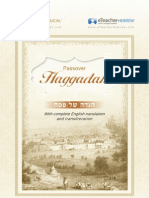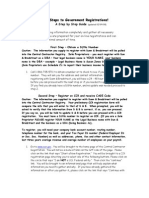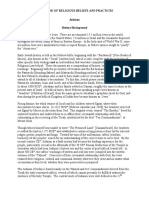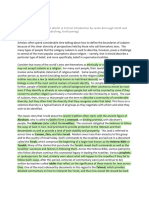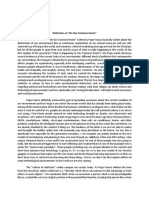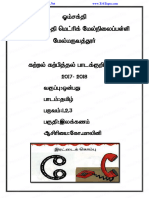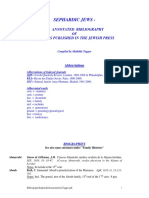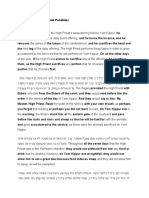How Judaism Spread
How Judaism Spread
Uploaded by
Anne Glydel Cruzado DalaganCopyright:
Available Formats
How Judaism Spread
How Judaism Spread
Uploaded by
Anne Glydel Cruzado DalaganCopyright
Available Formats
Share this document
Did you find this document useful?
Is this content inappropriate?
Copyright:
Available Formats
How Judaism Spread
How Judaism Spread
Uploaded by
Anne Glydel Cruzado DalaganCopyright:
Available Formats
Judaism Origins Judaism is the oldest monotheistic religion, and the history of Judaism cannot be separated from the
history of the Jewish people. Its foundation lies in the original covenant made between Abraham and God, circa 1900 BCE, when Abraham was called to leave his home in Ur and travel to Cannan (later known as Palestine and Israel), a land which God promised to give to his descendants. The second and chief covenant was made 450 years later when Moses led the Jews out of slavery in Egypt (the exodus) back to the lands of Canaan. At Mt Horeb (Sinai), God gave the Jewish people the 10 Commandants and other rules to live by (contained in the Torah, the first five books of the Bible), marking the beginning of Judaism as a structured religion. History and Spread Jewish civilisation after the exodus prospered in the kingdoms of Israel and Judah, originally headed by powerful kings like Saul, David and Solomon, who built the first great temple in Jerusalem. In 586 BCE, the Babylonians overran Jerusalem, taking many captives into exile and destroying the temple. A second temple was built when the Jews returned about 538 BCE, to be destroyed by the Romans in 70 CE. This destruction was decisive for the future of Judaism, replacing a sacrificial religion based around a temple with a tradition of studying and learning centred around local synagogues. By around 100CE, the canon of the Hebrew Bible was fixed. Between 200 and 700 CE, scholars compiled the Mishna, the definitive code of Jewish law. The Talmud (written interpretation of the scriptures) was compiled and the rules for the Jewish calendar were laid down. These scriptures and teachings were the basis of the religious worship that was practised around the world during the Jewish diaspora (exile). The two defining modern events for this community in exile were the Holocaust (1939-45), in which over six million Jews were killed by the Nazis, and the creation of the Jewish state of Israel in 1948. Key Movements Orthodox or traditional Judaism is Talmudic in belief and practices, and largest of the modern sectarian groupings Hasidism was a mystical movement emphasising ecstatic communion with God, which was developed in 18th Century Poland and central Europe Progressive Judaism is the term for liberal and reform movements which emerged in 19th Century Europe to adapt Judaism to contemporary living. It is critical of Talmudic fundamentalism and welcomes scientific research on the Bible. It commonly uses the vernacular in worship Conservative Judaism is a predominantly American form midway between Orthodox and Reform traditions Judaism is also divided into the Ashkenazi tradition (the majority), a northern European stream of Judaism, and the Sephardic tradition (the minority), developed in Spain, Portugal and the Middle East Organisational Structure Judaism is not hierarchical. The local synagogue is at the heart of Jewish religious activity, led by a rabbi (teacher). Rabbis are not priests all worshippers can approach God without an intermediary; liberal Judaism accepts female rabbis. Rabbis carry considerable authority within their stream of Judaism, but liberal and orthodox do not recognise each others rabbis as authoritative or representative. Councils of rabbis provide a network of support and coordination; Britains chief rabbi has some standing across the British Commonwealth. Key Beliefs Jews believe in the one living God who is transcendent, omnipotent, just and who reveals himself to human beings. The Hebrew word for this one true God is JHWH, or Yahweh. Shema: Jewish profession of faith. Hear, O Israel, the Lord our God, the Lord is One recited at morning and evening service. Central text is the Torah, or Pentateuch (the first five books of the Bible, revealed to Moses). Talmud: written interpretation and development of the Hebrew scriptures, in two versions, Palestinian and Babylonian.
Orthodox Jews follow strict dietary laws. Kosher (suitable) is the word used to describe food prepared in accordance with religious law. There is no instinctive evil, original sin or fundamental impurity in human beings since people are made in Gods image. The Jewish view of God A summary of what Jews believe about God God exists God can do anything at all. There is only one God God is beyond time: There are no other gods God has always existed God can't be subdivided into different persons God will always exist. (unlike theChristian view of God) God is just, but God is also merciful Jews should worship only the one God God punishes the bad God is Transcendent: God rewards the good God is above and beyond all earthly things. God is forgiving towards those who mess things God doesn't have a body up. Which means that God is neither female nor God is personal and accessible. male. God is interested in each individual God created the universe without help God listens to each individual God is omnipresent: God sometimes speaks to individuals, but in God is everywhere, all the time. unexpected ways. God is omnipotent: The Jews brought new ideas about God The Jewish idea of God is particularly important to the world because it was the Jews who developed two new ideas about God: There is only one God God chooses to behave in a way that is both just and fair. Before Judaism, people believed in lots of gods, and those gods behaved no better than human beings with supernatural powers. The Jews found themselves with a God who was ethical and good.
You might also like
- The Lost Scrolls of King Solomon Behrens, Richard, 1946 1st EdDocument412 pagesThe Lost Scrolls of King Solomon Behrens, Richard, 1946 1st EdLeonardo Careaga100% (1)
- Mishneh Torah EnglishDocument10 pagesMishneh Torah EnglishAmos Ferreira BarbosaNo ratings yet
- Alkaline Herbal Medicine Reverse Disease and Heal The Electric Body Aqiyl AniysDocument11 pagesAlkaline Herbal Medicine Reverse Disease and Heal The Electric Body Aqiyl AniysAdian AndrewsNo ratings yet
- JudaismDocument9 pagesJudaismIan AdamsNo ratings yet
- Pious Association SeminarDocument10 pagesPious Association SeminardinoydavidNo ratings yet
- Feinberg Image BsDocument12 pagesFeinberg Image Bssam kpNo ratings yet
- World Religions PowerpointDocument96 pagesWorld Religions Powerpointjeffpatten100% (14)
- Core Teaching of JudaismDocument1 pageCore Teaching of JudaismJennifer Dizon TuquibNo ratings yet
- Choosing JudaismDocument7 pagesChoosing JudaismAnonymous HtDbszqtNo ratings yet
- Jewish Languages: Jews and JudaismDocument7 pagesJewish Languages: Jews and Judaismdzimmer6No ratings yet
- Mashiv Haruach CBB Siddur Text PDFDocument128 pagesMashiv Haruach CBB Siddur Text PDFFrancisco Teodoro Godínez CastroNo ratings yet
- HanukkahDocument13 pagesHanukkahSerena CornoNo ratings yet
- Shabbatbook Draftlayout 1 1Document10 pagesShabbatbook Draftlayout 1 1api-126941131No ratings yet
- PeschacDocument53 pagesPeschacViorel SeriaNo ratings yet
- Speaking Sample Part 3 PromptDocument9 pagesSpeaking Sample Part 3 Promptcaifanes_90No ratings yet
- Jewish Standard, December 8, 2017Document72 pagesJewish Standard, December 8, 2017New Jersey Jewish StandardNo ratings yet
- Shavuot - Spiritual Gifts ShiurDocument4 pagesShavuot - Spiritual Gifts ShiurrwallNo ratings yet
- A Family HaggadahDocument40 pagesA Family HaggadahRomulo BittencourtNo ratings yet
- The Halakhic Status of The Secular Jew: A Question of Public, Not Personal, HalakhahDocument17 pagesThe Halakhic Status of The Secular Jew: A Question of Public, Not Personal, Halakhahoutdash2No ratings yet
- Expat - CL - Relocation Agency in ChileDocument20 pagesExpat - CL - Relocation Agency in ChileExpat.clNo ratings yet
- SBA Loans and MLMDocument5 pagesSBA Loans and MLMKevin ThompsonNo ratings yet
- (Judaism) A Guide To Shabbat Celebration - Hebrew English - Torah Jew IsraelDocument14 pages(Judaism) A Guide To Shabbat Celebration - Hebrew English - Torah Jew IsraelJose Galvez PissarroNo ratings yet
- SM Four Passports ANYONE Can ObtainDocument20 pagesSM Four Passports ANYONE Can ObtainShawn M. RillNo ratings yet
- Shabbat Seder Guide: A Concise Manual For ChristiansDocument21 pagesShabbat Seder Guide: A Concise Manual For ChristiansCibeles Jolivette GonzalezNo ratings yet
- Yiddish SongsDocument23 pagesYiddish SongsrociogordonNo ratings yet
- Toolkit AshkenazDocument72 pagesToolkit Ashkenazynoue100% (1)
- The Bidayuh Itself MeanDocument9 pagesThe Bidayuh Itself MeanGowry Sellan GreshNo ratings yet
- Customs and Taboos of Bidayuh CommunityDocument13 pagesCustoms and Taboos of Bidayuh CommunityMarlon Abdullah100% (1)
- Judaism As A ReligionDocument164 pagesJudaism As A ReligionWiliam BraunNo ratings yet
- Conversion To JudaismDocument5 pagesConversion To JudaismTalibNo ratings yet
- Four Steps To Government RegistrationsDocument7 pagesFour Steps To Government RegistrationsJustin HansenNo ratings yet
- JudaismDocument15 pagesJudaismYeshua TsukomoNo ratings yet
- Judaism Introduction (ALOLOD)Document6 pagesJudaism Introduction (ALOLOD)Jane Ann AlolodNo ratings yet
- Prefinals JudaismDocument4 pagesPrefinals JudaismBea DesamparadoNo ratings yet
- IWRBS Comparative AnalysisDocument39 pagesIWRBS Comparative Analysisiccdolotallas.csrlNo ratings yet
- Judaism Textbook NotesDocument26 pagesJudaism Textbook Notesmu.ucheukahNo ratings yet
- JudaismDocument3 pagesJudaismVince Lloyd RaborNo ratings yet
- Cawayan National High School: Teacher-Made Learner's Home Task Week 4Document9 pagesCawayan National High School: Teacher-Made Learner's Home Task Week 4Geraldine BelandresNo ratings yet
- JudaismDocument5 pagesJudaismJannah FateNo ratings yet
- Judaism: Group:-Hadi Abbas Waleed Bilal HunainDocument12 pagesJudaism: Group:-Hadi Abbas Waleed Bilal HunainHadi AbbasNo ratings yet
- Judaism Christianity IslamDocument7 pagesJudaism Christianity Islamjoan tomarongNo ratings yet
- Judaism Christianity IslamDocument9 pagesJudaism Christianity IslamMango FruitNo ratings yet
- GROUP1 Judaism ChristianityDocument27 pagesGROUP1 Judaism ChristianityJeric SulitNo ratings yet
- Comparing Christianity with World Religions: The Spirit of Truth and the Spirit of ErrorFrom EverandComparing Christianity with World Religions: The Spirit of Truth and the Spirit of ErrorNo ratings yet
- JUDAISMDocument16 pagesJUDAISMDian De la CruzNo ratings yet
- The Early Hebews - JudaismDocument25 pagesThe Early Hebews - JudaismaveheeNo ratings yet
- Judaism and ChristianityDocument31 pagesJudaism and ChristianityDivine Grace CabardoNo ratings yet
- Compilation of Learnings (Religion)Document33 pagesCompilation of Learnings (Religion)MarcoNo ratings yet
- JudaismDocument21 pagesJudaismArvie TV100% (1)
- PRETENIENTETE40Document41 pagesPRETENIENTETE40weebmyphone11No ratings yet
- Jewish Beliefs and Practices PDFDocument10 pagesJewish Beliefs and Practices PDFHenry LanguisanNo ratings yet
- Judaism g3 ReportDocument53 pagesJudaism g3 Reportrochellecahilo10No ratings yet
- (Key Words & Phrases) (Recording of Notes in Class)Document5 pages(Key Words & Phrases) (Recording of Notes in Class)Anonymous qg9vyWhNo ratings yet
- Brief History, Core Teachings of Judaism (Week 4)Document8 pagesBrief History, Core Teachings of Judaism (Week 4)ANGELICA CASTILLO ERGUIZANo ratings yet
- Judaism and HinduDocument4 pagesJudaism and HinduJasper YogcayogNo ratings yet
- HUMSS 1 - Week 4-7Document12 pagesHUMSS 1 - Week 4-7welmark.bagusNo ratings yet
- LESSON 3 - JudaismDocument5 pagesLESSON 3 - JudaismVictor Noel AlamisNo ratings yet
- Judaism ReadingDocument3 pagesJudaism Readingapi-273354503No ratings yet
- JudaismDocument23 pagesJudaismIslamHouseNo ratings yet
- JudaismDocument31 pagesJudaism89fzgghq79No ratings yet
- (Midterm) Introduction To World Religions and Belief SystemsDocument74 pages(Midterm) Introduction To World Religions and Belief SystemsAdrian Dionisio0% (1)
- GE 143 4B Reflection Paper On Laudato SiDocument2 pagesGE 143 4B Reflection Paper On Laudato SiAnne Glydel Cruzado Dalagan100% (3)
- FN 1reflection Paper MovieDocument3 pagesFN 1reflection Paper MovieAnne Glydel Cruzado DalaganNo ratings yet
- Earth Hour PaperDocument6 pagesEarth Hour PaperAnne Glydel Cruzado DalaganNo ratings yet
- Physics 71 2nd LE ReviewerDocument3 pagesPhysics 71 2nd LE ReviewerAnne Glydel Cruzado DalaganNo ratings yet
- NehemiahDocument1 pageNehemiahmarveldgunawanNo ratings yet
- Say vs. Tell ExercisesDocument3 pagesSay vs. Tell ExercisesGabriela R33% (3)
- 9th Tamil Grammar Study MaterialsDocument118 pages9th Tamil Grammar Study MaterialsBHAVNA PKNo ratings yet
- Repentance Beyond Sin: Rabbi Dr. Norman LammDocument3 pagesRepentance Beyond Sin: Rabbi Dr. Norman Lammoutdash2No ratings yet
- Heavenly PowersDocument7 pagesHeavenly PowersNyanginja100% (1)
- Concept of Evil in Early KabbalahDocument25 pagesConcept of Evil in Early KabbalahAycan ÖzenbaşNo ratings yet
- Sephardic Jews - : An Annotated Bibliography OF Articles Published in The Jewish PressDocument23 pagesSephardic Jews - : An Annotated Bibliography OF Articles Published in The Jewish PressNancy Marianna Muñoz ValeraNo ratings yet
- Jewish Sacred TextsDocument2 pagesJewish Sacred TextsAlyanna Elisse VergaraNo ratings yet
- Mishnah Yoma 1 (Description)Document3 pagesMishnah Yoma 1 (Description)Roger ReyesNo ratings yet
- CO's 2007Document312 pagesCO's 2007JAGUAR GAMINGNo ratings yet
- Mas. Amz. 581Document54 pagesMas. Amz. 581Nabila AidoudNo ratings yet
- Response To Anti-Semitic Distortions of The TalmudDocument10 pagesResponse To Anti-Semitic Distortions of The TalmudpanfluteNo ratings yet
- Abijah: 1Ch - 7:8 1Ch - 2:24 1sa - 8:2 1Ch - 6:28Document2 pagesAbijah: 1Ch - 7:8 1Ch - 2:24 1sa - 8:2 1Ch - 6:28Joe DinglasanNo ratings yet
- Moed Katan 9Document93 pagesMoed Katan 9Julian Ungar-SargonNo ratings yet
- Siman 305 Seif 1Document1 pageSiman 305 Seif 1InnerspaceNo ratings yet
- The Invisible Museum: History and Memory of Morocco, CasesDocument18 pagesThe Invisible Museum: History and Memory of Morocco, CasesmagnesmuseumNo ratings yet
- Is It Shabbos Yet?: in The Beginning..Document3 pagesIs It Shabbos Yet?: in The Beginning..Avrohom CherlinNo ratings yet
- The Worship of The Shekhinah in Early KaDocument13 pagesThe Worship of The Shekhinah in Early KaJoao de deusNo ratings yet
- The Phoenicians and The HebrewsDocument15 pagesThe Phoenicians and The HebrewsLuis100% (1)
- The Products of The BlessingDocument2 pagesThe Products of The BlessingJulius NNo ratings yet
- Roman Imperial Cult in The Galilee. Structures, Functions and Dynamics. Monika BernettDocument20 pagesRoman Imperial Cult in The Galilee. Structures, Functions and Dynamics. Monika BernettDolores MonteroNo ratings yet
- JudaismDocument5 pagesJudaismJannah FateNo ratings yet
- GospelDocument3 pagesGospelReign NeyraNo ratings yet
- Nephilim The Children of LilithDocument9 pagesNephilim The Children of LilithAdim AresNo ratings yet
- K.Ivanov, Pr-Dw3t - The House of Morning AdorationDocument17 pagesK.Ivanov, Pr-Dw3t - The House of Morning AdorationMartinaNo ratings yet
- Eruvin 95Document29 pagesEruvin 95Julian Ungar-SargonNo ratings yet
- Salome-Oscar WildeDocument50 pagesSalome-Oscar WildeAsya ÖzparlakNo ratings yet
- Three Main Jewish Sects: Jewish Social and Religious Institutions Chart 3-1Document2 pagesThree Main Jewish Sects: Jewish Social and Religious Institutions Chart 3-1sanjayrajanand18No ratings yet













